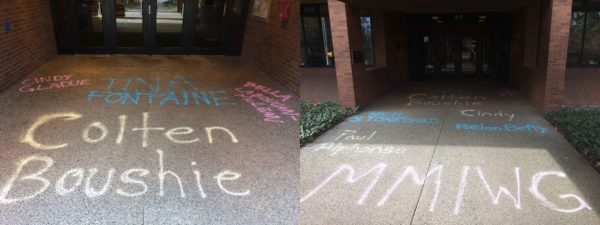News comes amid demonstrations on campus, across Canada

Spray-painted signs adorn the concrete outside the Faculty of Law building and the Fraser building. Photos by Josh Kozelj, Staff Writer
It’s not everyday that a world first is announced at UVic, but that’s exactly the news that the UVic law department shared on Feb. 21.
The law department released plans to combine the study of Indigenous and non-Indigenous law into one program that would allow students to graduate with two law degrees: Canadian Common Law and Indigenous Legal Orders (otherwise known as Juris Doctor and Juris Indigenarum Doctor).
“This program builds on UVic’s longstanding commitment to, and unique relationship with, the First Peoples of Canada,” UVic President Jamie Cassels said in a media release. “This joint-degree program is also a direct response to a call for action from the Truth and Reconciliation Commission to establish Indigenous law institutes for the development, use, and understanding of Indigenous law.”
The program is slated to open in September 2018, pending approval under B.C.’s Degree Authorization Act.
This news comes in the wake of recent verdicts acquitting white males of the murders of First Nations teenagers Tina Fontaine and Colten Boushie, which has sparked uproar across the country.
In 2014, Fontaine, a 15-year old from the Sagkeeng First Nation north of Winnipeg, went missing, only to be found weeks later wrapped in a duvet cover in a river. Her case was a catalyst for the National Inquiry into Missing and Murdered Indigenous Women and Girls, and the recent acquittal has sparked rallies in major Canadian cities in support of justice for Fontaine.
“This is not the outcome anybody wanted. The systems, everything that was involved in Tina’s life, failed her,” Manitoba Keewatinowi Okimakanak Grand Chief Sheila North said after the jury verdict. “We’ve all failed her. We as a nation need to do better for our young people.”
The Crown found no forensic information or eyewitnesses linking Raymond Cormier, who was initially suspected to be involved with the murder of Fontaine, to the cause of her death.
Thirteen days before Cormier was acquitted, Saskatchewan farmer Gerald Stanley was found not guilty in the murder of Red Pheasant First Nations teenager Colten Boushie, further dividing the country.
“Thirty per cent of Canadians surveyed thought the jury’s verdict was ‘good and fair’ while 32 per cent thought the outcome was flawed and wrong,” a CBC article said, quoting an Angus Reid poll of Stanley’s verdict. “Thirty-eight per cent weren’t sure, according to the poll.”
Specifically here at UVic, posters and chalk written words have appeared on the UVic Faculty of Law building and the Murray and Anne Fraser building in support of Fontaine and Boushie.
“This is the very first law degree of its kind, and it is going to be a vital part of rebuilding Indigenous law to meet today’s challenges.”
A day of action/student walk-out is planned to occur on Mar. 14, led by UVic’s Indigenous Law Students’ Association, in protest of the recent acquittals of Cormier and Stanley. The walk-out is scheduled for 11 a.m., and will continue in the form of a peaceful march around Ring Road ending back at the Fraser building.
A form of long-term action, UVic’s new program will allow students to further their learning in areas such as environmental protection and Indigenous governance, two topics that are currently hot-button issues for this country’s judicial system.
The program follows the provincial government’s announcement in their 2018 budget. The NDP made commitments to fund Indigenous programs, announcing $50 million for Indigenous language revitalization and $6 million over three years for friendship centres in a move towards reconciliation.
“We appreciate the provincial government’s support for this unique and transformative program whose graduates will be leaders in numerous fields in their communities in B.C. and across Canada,” says Cassels.
The program was conceived by John Borrows and Val Napoleon, two UVic law professors who are Indigenous law experts.
For Borrows, Indigenous law is different from common law in the ways it looks to nature and to the land to provide law, order and peace between people, where common law would refer to old cases with precedents to decide verdicts.
Both Napoleon and Borrows are excited about the new program’s potential to provide UVic graduates with insight into both Indigenous and common law.
“UVic’s Indigenous Law Degree program will equip our students to take up that work at every level — local to national, private to public, and beyond,” Napoleon said in a media release. “This is the very first law degree of its kind, and it is going to be a vital part of rebuilding Indigenous law to meet today’s challenges.”






